2015年12月六级真题第3套
- 格式:docx
- 大小:92.27 KB
- 文档页数:8
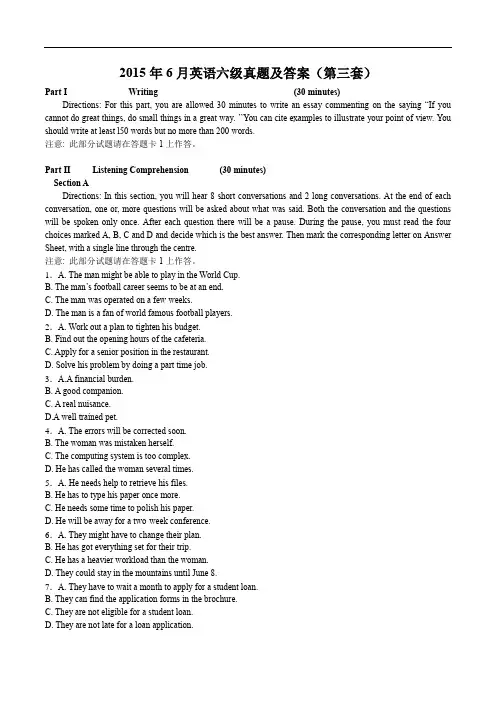
2015年6月英语六级真题及答案(第三套)Part I Writing (30 minutes)Directions: For this part, you are allowed 30 minutes to write an essay commenting on the saying “If you cannot do great things, do small things in a great way. ’’You can cite examples to illustrate your point of view. You should write at least l50 words but no more than 200 words.注意: 此部分试题请在答题卡1上作答。
Part II Listening Comprehension (30 minutes)Section ADirections: In this section, you will hear 8 short conversations and 2 long conversations. At the end of each conversation, one or, more questions will be asked about what was said. Both the conversation and the questions will be spoken only once. After each question there will be a pause. During the pause, you must read the four choices marked A, B, C and D and decide which is the best answer. Then mark the corresponding letter on Answer Sheet, with a single line through the centre.注意: 此部分试题请在答题卡1上作答。
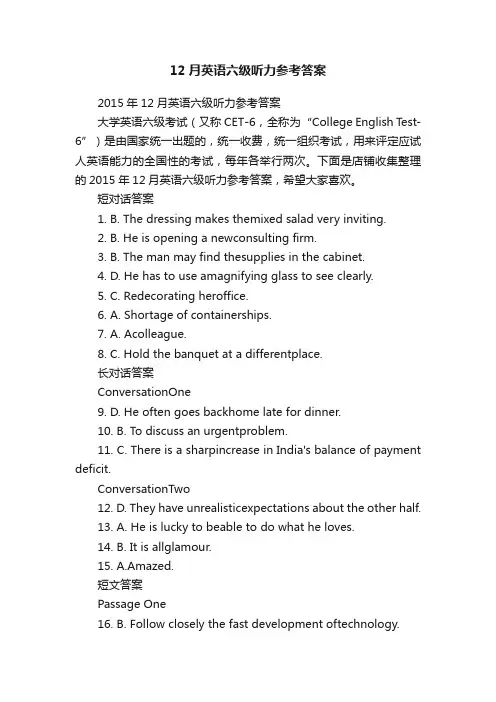
12月英语六级听力参考答案2015年12月英语六级听力参考答案大学英语六级考试(又称CET-6,全称为“College English T est-6”)是由国家统一出题的,统一收费,统一组织考试,用来评定应试人英语能力的全国性的考试,每年各举行两次。
下面是店铺收集整理的2015年12月英语六级听力参考答案,希望大家喜欢。
短对话答案1. B. The dressing makes themixed salad very inviting.2. B. He is opening a newconsulting firm.3. B. The man may find thesupplies in the cabinet.4. D. He has to use amagnifying glass to see clearly.5. C. Redecorating heroffice.6. A. Shortage of containerships.7. A. Acolleague.8. C. Hold the banquet at a differentplace.长对话答案ConversationOne9. D. He often goes backhome late for dinner.10. B. To discuss an urgentproblem.11. C. There is a sharpincrease in India's balance of payment deficit.ConversationTwo12. D. They have unrealisticexpectations about the other half.13. A. He is lucky to beable to do what he loves.14. B. It is allglamour.15. A.Amazed.短文答案Passage One16. B. Follow closely the fast development oftechnology.17. B. What type of personnel the team should becomposed of.18. D. A team manager should develop a certainset skills.Passage Two19. A. It is a program allowing people to shareinformation on the Web.20. B. He met with an entrepreneur named JimClark.21. B. They had confidence in his newideas.Passage Three22. A. Word-of-mouthadvertising.23. D. To build up theirreputation.24. D. By using the servicesof large advertising agencies.25. C. Pre-test alternative ads or commercialsin certain regions.短文听写答案26. eternal27. diminishing28. absolute29. succeed30. on a vast scale31. As regards32. used up33. disposing34. modification35. magnitude【第一版】短对话1.W: Wow, what a variety of salads you’ve got on your menu, could yourecommend something special?M: Well, I think you can try this mixed salad. We make the dressingwith fresh berries.Q: what does the man mean?2.W: I was talking to Mary the other day, and she mentioned that your newconsulting firm is doing really well.M: Yes, business paced up much faster than we anticipated. We now haveover 200 clients.Q: What do we learn about the man from the conversation?3.W: Do you know where we keep flash disks and printing paper?M: They should be in the cabinet if there are any. That’s where we keepall of our office supplies.Q: what does the woman mean?4.W: The printing of this dictionary is so small. I can’t read theexplanations at all.M: Let me get my magnify glass. I know I just can’t do without it.Q: What does the man mean?5.W: I’m considering having my office redecorated, the furniture is oldand the paint is chipping.M: I’ll give you my sister-in-law’s number. She just graduated from aninterior designing academy, and will give a free estimate.Q: What is the woman considering?6.W: We have a full load of goods that needs to be delivered.But wecan’t get a container ship anyway.M: That’s always being a problem in this port. The facilities here arenever able to meet our needs.Q: What are the speakers talking about?7.W: Why didn’t Rod get a pay raise?M: The boss just isn’t convinced that his work attitude warranted it.She said she saw him by the coffee machine more often than at his desk.Q: What are the speakers talking about?8.W: The hotel called, saying that because of the scheduling there, theywon’t be are able to cate r for our banquet.M: I know an Indian restaurant on the high street that offers a specialdiner for groups. The food is excellent, and the room is large enough toaccommodate us.Q: What does the man suggest they do?长对话Conversation 1M: Hello Jane.W: Hello Paul.M: Please coming. I’m just getting ready to go home. Susan is expectingme for dinner. I wanted to be on time for a change.W: Look, I’m terribly sorry to drop in this time on Friday, Paul, butit is rather important.M: That’s OK. What’s the proble m?W: Well, Paul, I won’t keep you long. You see there is a problem withthe exchange rates. The Indian Rupee has taken a fall on the foreign exchangemarket. You see there is being a sharp increase in Indian’s balance of paymentdeficit.M: I see. How seriou s, isn’t it?W: Well, as you know, there have been reports of unrest India, and theprospects for the Rupee look pretty gloomy.M: And that’s going to affect us, as if we didn’t have enough problemson our hands.W: So I thought it would be wise to take out forward exchange cover toprotect our position on the outstanding contract.M: Just a minute. Forward exchange cover, now what does that meanexactly?W: Well, it means that JO notes enters into a commitment to sell IndianRupees at the present rate.M: I see. And how will that benefit us?W: Well, JO notes wouldn’t lose out if Indian Rupee falls further.M: What will it cost, Jane?W: A small percentage, about 1% and that can be built into the price ofthe bike.M: Well, I don’t suppose there is much choice. All right Jane, let’sput it into action.Q9: What do we learn aboutthe man’s daily life?Q10: Why did the woman cometo see the man?Q11: What makes the womanworry about the Indian Rupee?Conversation 2W: Charles, among other things, you regarded as one of the America’sgreat masters of the blues. A musical idiom does essentially about loss,particularly the loss of romantic love. Why does love die?M: People often get into love affairs because they have unrealisticexpectations about somebody. Then when the persondoesn’t turn out to be whothey thought he or she was, they start thinking maybe I can change him or her.That kind of thinking is a mistake. Because when the dust settles, people aregoing to be pretty much what they are. It’s a rare thing for anybody to be ableto change who they really are. And this creates a lot of problems.W: At 62, you continue to spend a large percentage of your lifetouring. What appeals to you about life on the road?M: Music, I don’t especially love life on the road, but I figur e if youare lucky enough to be able to do what you truly love doing, you’ve got theultimate of life.W: What’s the most widely-held misconception about the life of a famousmusician?M: People think it’s all glamour. Actually we have the same troublesthey d o. Playing music doesn’t mean life treats you any better.W: How do you feel about being recognized everywhere you go?M: You think I be used to it by now. But I still find it fascinating.You go to a little town in Japan, where nobody speaks English, yet t hey knowyou on side and know all your music. I’m still amazed by the love peopleexpress for me and by music.Q12: What does the man sayabout most people when they get into love affairs?Q13: What does the man sayabout himself as a singer on the road most of his life?Q14: What do most peoplethink of the life of a famous musician?Q15: How does the man feelwhenever he was recognized by his fans?短文Passage 1Changing technology and markets have stimulated the team approach tomanagement. Inflation, resource scarcity, reduced personnel levels and budgetcuts have all underscore the need for better coordination in organizations.Team management provides for this coordination. Team management calls for newskills if personnel potential is to be fully realized. Although a team may be composed ofknowledgeable people, they must learn new ways of relating and working togetherto solve cross-functional problems. When teams consist to be experiencedemployees from hierarchical organizations, who have been condition totraditional organizational culture. Cooperation may not occur naturally, itmainly to be created. Furthermore, the issue is not just how the team canfunction more effectively, but how it integrates with the overall organization,all society that it supposes it serves.A group of individuals is notautomatically a team. Therefore, team building may be necessary in order toimprove the group’s performance. Casey, an expert in this field, suggests thatthe cooperation process within teams must be organized, promoted and managed.He believes the team corporation results when members go beyond theirindividual capabilities, beyond what each is used to being and doing. T ogether,the team may then produce something new, unique and superior to that of any onemember. For this to happen, he suggests the multi-cultural managers exhibitunderstanding of their own and others’ cultural influences and limitations.They should also cultivate such skills as toleration of ambiguity, persistenceand patience, as well as assertedness. If a team manager exemplifies suchqualities, then the team as a whole would be better able to realizetheirpotential and achieve their objectives.。
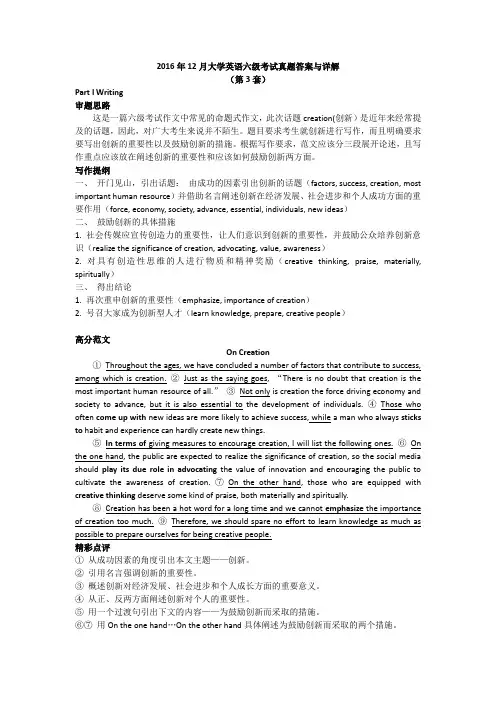
2016年12月大学英语六级考试真题答案与详解(第3套)Part I Writing审题思路这是一篇六级考试作文中常见的命题式作文,此次话题creation(创新)是近年来经常提及的话题,因此,对广大考生来说并不陌生。
题目要求考生就创新进行写作,而且明确要求要写出创新的重要性以及鼓励创新的措施。
根据写作要求,范文应该分三段展开论述,且写作重点应该放在阐述创新的重要性和应该如何鼓励创新两方面。
写作提纲一、开门见山,引出话题:由成功的因素引出创新的话题(factors, success, creation, most important human resource)并借助名言阐述创新在经济发展、社会进步和个人成功方面的重要作用(force, economy, society, advance, essential, individuals, new ideas)二、鼓励创新的具体措施1. 社会传媒应宣传创造力的重要性,让人们意识到创新的重要性,并鼓励公众培养创新意识(realize the significance of creation, advocating, value, awareness)2. 对具有创造性思维的人进行物质和精神奖励(creative thinking, praise, materially, spiritually)三、得出结论1. 再次重申创新的重要性(emphasize, importance of creation)2. 号召大家成为创新型人才(learn knowledge, prepare, creative people)高分范文On Creation①Throughout the ages, we have concluded a number of factors that contribute to success, among which is creation. ②Just as the saying goes, “There is no doubt that creation is the most important human resource of all.”③Not only is creation the force driving economy and society to advance, but it is also essential to the development of individuals. ④Those who often come up with new ideas are more likely to achieve success, while a man who always sticks to habit and experience can hardly create new things.⑤In terms of giving measures to encourage creation, I will list the following ones. ⑥On the one hand, the public are expected to realize the significance of creation, so the social media should play its due role in advocating the value of innovation and encouraging the public to cultivate the awareness of creation. ⑦On the other hand, those who are equipped with creative thinking deserve some kind of praise, both materially and spiritually.⑧Creation has been a hot word for a long time and we cannot emphasize the importance of creation too much. ⑨Therefore, we should spare no effort to learn knowledge as much as possible to prepare ourselves for being creative people.精彩点评①从成功因素的角度引出本文主题——创新。
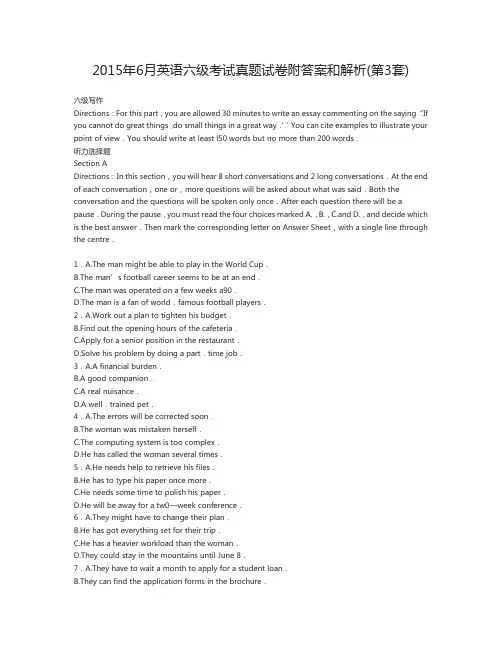
2015年6月英语六级考试真题试卷附答案和解析(第3套)六级写作Directions:For this part,you are allowed 30 minutes to write an essay commenting on the saying“If you cannot do great things,do small things in a great way.’’You can cite examples to illustrate your point of view.You should write at least l50 words but no more than 200 words.听力选择题Section ADirections:In this section,you will hear 8 short conversations and 2 long conversations.At the end of each conversation,one or,more questions will be asked about what was said.Both the conversation and the questions will be spoken only once.After each question there will be a pause.During the pause,you must read the four choices marked A.,B.,C.and D.,and decide which is the best answer.Then mark the corresponding letter on Answer Sheet,with a single line through the centre.1.A.The man might be able to play in the World Cup.B.The man’s football career seems to be at an end.C.The man was operated on a few weeks a90.D.The man is a fan of world.famous football players.2.A.Work out a plan to tighten his budget.B.Find out the opening hours of the cafeteria.C.Apply for a senior position in the restaurant.D.Solve his problem by doing a part.time job.3.A.A financial burden.B.A good companion.C.A real nuisance.D.A well.trained pet.4.A.The errors will be corrected soon.B.The woman was mistaken herself.C.The computing system is too complex.D.He has called the woman several times.5.A.He needs help to retrieve his files.B.He has to type his paper once more.C.He needs some time to polish his paper.D.He will be away for a tw0—week conference.6.A.They might have to change their plan.B.He has got everything set for their trip.C.He has a heavier workload than the woman.D.They could stay in the mountains until June 8.7.A.They have to wait a month to apply for a student loan.B.They can find the application forms in the brochure.C.They are not eligible for a student loan.D.They are not late for a loan application.8.A.New laws are yet to be made to reduce pollutant release.B.Pollution has attracted little attention from the public.C.The quality of air will surely change for the better.D.It’Il take years to bring air pollution under control.Questions 9 t0 12 are based on the conversation you have just heard.9.A.Enormous size of its stores.B.Numerous varieties of food.C.Its appealing surroundings.D.Its rich and colorful history.10.A.An ancient buildin9.B.A world of antiques.C.An Egyptian museum.D.An Egyptian memorial.11.A.Its power bill reaches£9 million a year.B.It sells thousands of light bulbs a day.C.It supplies power to a nearby town.D.It generates 70%of the electricity it uses.12.A.11 500.B.30 000.C.250 000.D.300 000.Questions 13 t0 15 are based on the conversation you have just heard.13.A.Transferring to another department.B.Studying accounting at a university.C.Thinking about doing a different job.D.Making preparations for her weddin9.14.A.She has finally got a promotion and a pay raise.B.She has got a satisfactory job in another company.C.She could at last leave the accounting department.D.She managed to keep her position in the company.15.A.He and Andrea have proved to be a perfect match.B.He changed his mind about marriage unexpectedly.C.He declared that he would remain single all his life.D.He would marry Andrea even without meeting her.Section BDirections:In this section.you will hear 3 short passages.Af the end of each passage.you will hear some questions.Both the passage and the questions will be spoken only once.After you hear a question,you must choose the best answer from the four choices marked A.,B.,C.and D..Then mark the corresponding letter on Answer Sheet T with a single line through the centre.Passage OneQuestions l6 t0 19 are based on the passage you have just heard.16.A.They are motorcycles designated for water sports.B.They are speedy boats restricted in narrow waterways.C.They are becoming an efficient form of water transportation.D.They are getting more popular as a means of water recreation.17.A.Water scooter operators’lack of experience.B.Vacationers’disregard of water safety rules.C.Overloading of small boats and other craft.D.Carelessness of people boating along the shore.18.A.They scare whales to death.B.They produce too much noise.C.They discharge toxic emissions.D.They endanger lots of water life.19.A.Expand operating areas.B.Restrict operating hours.C.Limit the use of water scooters.D.Enforce necessary regulations.Passage TwoQuestions 20 t0 22 are based on the passage you have just heard.20.A.They are stable.B.They are close.C.They are strained.D.They are changin9.21.A.They are fully occupied with their own business.B.Not many of them stay in the same place for lon9.C.Not many of them can win trust from their neighbors.D.They attach less importance to interpersonal relations.22.A.Count on each other for help.B.Give each other a cold shoulder.C.Keep a friendly distance.D.Build a fence between them.Passage ThreeQuestions 23 t0 25 are based on the passage you have just heard.23.A.It may produce an increasing number of idle youngsters.B.It may affect the quality of higher education in America.C.It may cause many schools to go out of operation.D.It may lead to a lack of properly educated workers.24.A.It l:5 iess serlotls in cities than tn rural areas.B.It affects both junior and senior high schools.C.It results from a worsening economic climate.D.It is a new challenge facing American educators.25.A. Allowing them to choose their favorite teachers.B.Creating a more relaxed learning environment.C.Rewarding excellent academic performance.D.Helping them to develop better study habits.听力填空题Section CDirections:In this section,you will hear a passage three times.When the passage is read for the first time,you should listen carefully for its general idea.When the passage is read for the second time,you are required to fill in the blanks with the exact words you have just heard.Finally,when the passage is read for the third time,you should check what you have written.I'm interested in the criminal justice system of our country.It seems to me that something has to be done,if we’re to(26)as a country.I certainly don’t know what the answers to our problems are.Things certainly get (27)in a hurry when you get into them,but l wonder if something couldn’t be done to deal with some of these problems.One thing I'm concerned about is our practice of putting(28)in jail who haven’t harmed anyone.Why not work out some system whereby they can pay back the debts they owe society instead of (29)another debt by going to prison and,of course,coming‘30 hardened criminals.I'm also concerned about the short prison sentences people are (31)serious crimes.Of course one alternative to this is to(32)capital punishment,but I'm not sure l would be for that.I'm not sure it’s right to take an eye for an eye.The alternative to capital punishment is longer sentences。
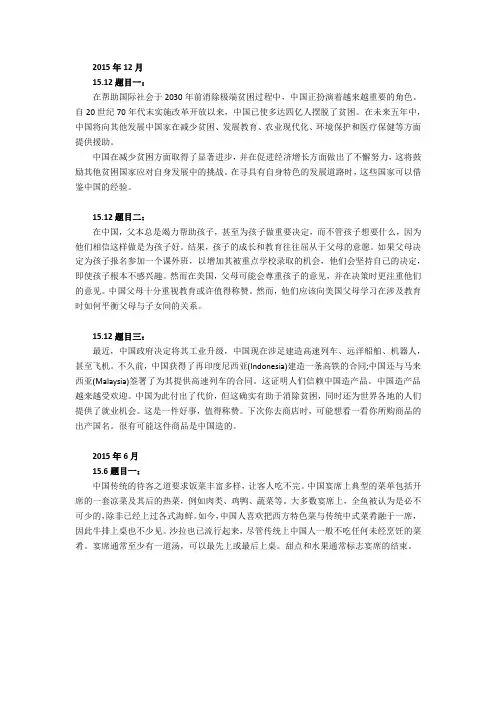
2015年12月15.12题目一:在帮助国际社会于2030年前消除极端贫困过程中,中国正扮演着越来越重要的角色。
自20世纪70年代末实施改革开放以来,中国已使多达四亿人摆脱了贫困。
在未来五年中,中国将向其他发展中国家在减少贫困、发展教育、农业现代化、环境保护和医疗保健等方面提供援助。
中国在减少贫困方面取得了显著进步,并在促进经济增长方面做出了不懈努力,这将鼓励其他贫困国家应对自身发展中的挑战。
在寻具有自身特色的发展道路时,这些国家可以借鉴中国的经验。
15.12题目二:在中国,父本总是竭力帮助孩子,甚至为孩子做重要决定,而不管孩子想要什么,因为他们相信这样做是为孩子好。
结果,孩子的成长和教育往往屈从于父母的意愿。
如果父母决定为孩子报名参加一个课外班,以增加其被重点学校录取的机会,他们会坚持自己的决定,即使孩子根本不感兴趣。
然而在美国,父母可能会尊重孩子的意见,并在决策时更注重他们的意见。
中国父母十分重视教育或许值得称赞。
然而,他们应该向美国父母学习在涉及教育时如何平衡父母与子女间的关系。
15.12题目三:最近,中国政府决定将其工业升级,中国现在涉足建造高速列车、远洋船舶、机器人,甚至飞机。
不久前,中国获得了再印度尼西亚(Indonesia)建造一条高铁的合同;中国还与马来西亚(Malaysia)签署了为其提供高速列车的合同。
这证明人们信赖中国造产品。
中国造产品越来越受欢迎。
中国为此付出了代价,但这确实有助于消除贫困,同时还为世界各地的人们提供了就业机会。
这是一件好事,值得称赞。
下次你去商店时,可能想看一看你所购商品的出产国名。
很有可能这件商品是中国造的。
2015年6月15.6题目一:中国传统的待客之道要求饭菜丰富多样,让客人吃不完。
中国宴席上典型的菜单包括开席的一套凉菜及其后的热菜,例如肉类、鸡鸭、蔬菜等。
大多数宴席上,全鱼被认为是必不可少的,除非已经上过各式海鲜。
如今,中国人喜欢把西方特色菜与传统中式菜肴融于一席,因此牛排上桌也不少见。
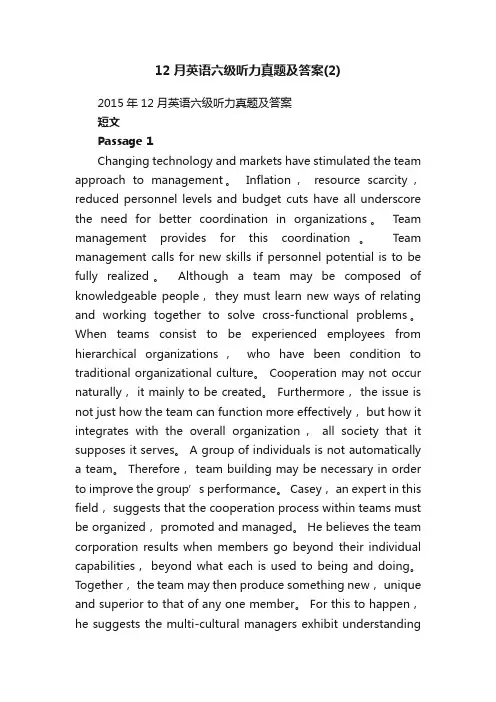
12月英语六级听力真题及答案(2)2015年12月英语六级听力真题及答案短文Passage 1Changing technology and markets have stimulated the team approach to management。
Inflation,resource scarcity,reduced personnel levels and budget cuts have all underscore the need for better coordination in organizations。
Team management provides for this coordination。
Team management calls for new skills if personnel potential is to be fully realized。
Although a team may be composed of knowledgeable people, they must learn new ways of relating and working together to solve cross-functional problems。
When teams consist to be experienced employees from hierarchical organizations,who have been condition to traditional organizational culture。
Cooperation may not occur naturally, it mainly to be created。
Furthermore, the issue is not just how the team can function more effectively, but how it integrates with the overall organization,all society that it supposes it serves。
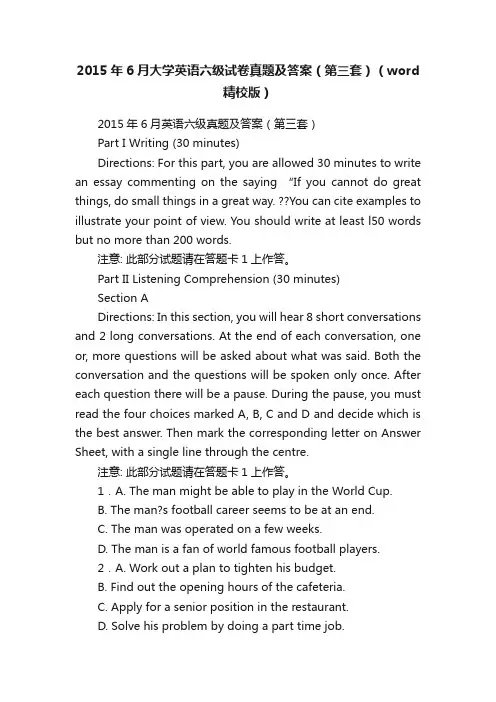
2015年6月大学英语六级试卷真题及答案(第三套)(word精校版)2015年6月英语六级真题及答案(第三套)Part I Writing (30 minutes)Directions: For this part, you are allowed 30 minutes to write an essay commenting on the saying “If you cannot do great things, do small things in a great way. ??You can cite examples to illustrate your point of view. You should write at least l50 words but no more than 200 words.注意: 此部分试题请在答题卡1上作答。
Part II Listening Comprehension (30 minutes)Section ADirections: In this section, you will hear 8 short conversations and 2 long conversations. At the end of each conversation, one or, more questions will be asked about what was said. Both the conversation and the questions will be spoken only once. After each question there will be a pause. During the pause, you must read the four choices marked A, B, C and D and decide which is the best answer. Then mark the corresponding letter on Answer Sheet, with a single line through the centre.注意: 此部分试题请在答题卡1上作答。
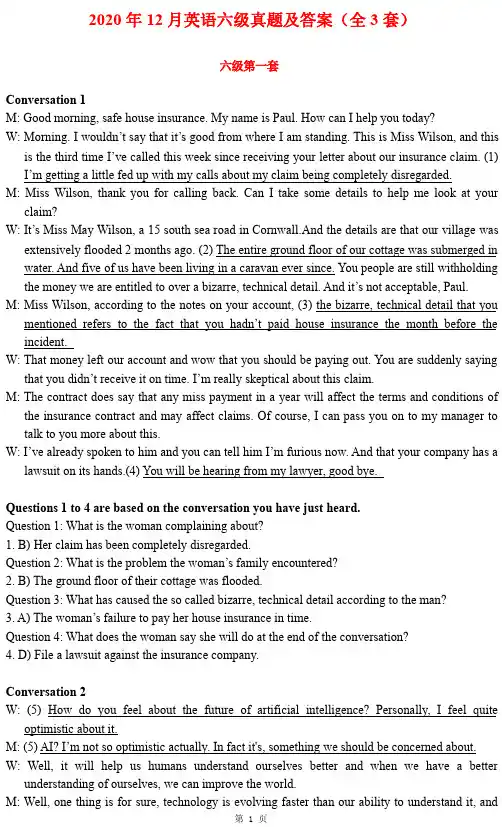
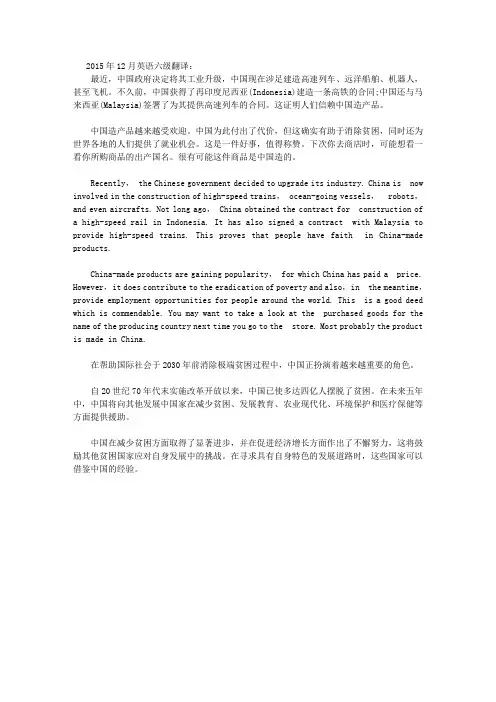
2015年12月英语六级翻译:最近,中国政府决定将其工业升级,中国现在涉足建造高速列车、远洋船舶、机器人,甚至飞机。
不久前,中国获得了再印度尼西亚(Indonesia)建造一条高铁的合同;中国还与马来西亚(Malaysia)签署了为其提供高速列车的合同。
这证明人们信赖中国造产品。
中国造产品越来越受欢迎。
中国为此付出了代价,但这确实有助于消除贫困,同时还为世界各地的人们提供了就业机会。
这是一件好事,值得称赞。
下次你去商店时,可能想看一看你所购商品的出产国名。
很有可能这件商品是中国造的。
Recently, the Chinese government decided to upgrade its industry. China is now involved in the construction of high-speed trains, ocean-going vessels, robots,and even aircrafts. Not long ago, China obtained the contract for construction of a high-speed rail in Indonesia. It has also signed a contract with Malaysia to provide high-speed trains. This proves that people have faith in China-made products.China-made products are gaining popularity, for which China has paid a price. However, it does contribute to the eradication of poverty and also, in the meantime,provide employment opportunities for people around the world. This is a good deed which is commendable. You may want to take a look at the purchased goods for the name of the producing country next time you go to the store. Most probably the product is made in China.在帮助国际社会于2030年前消除极端贫困过程中,中国正扮演着越来越重要的角色。
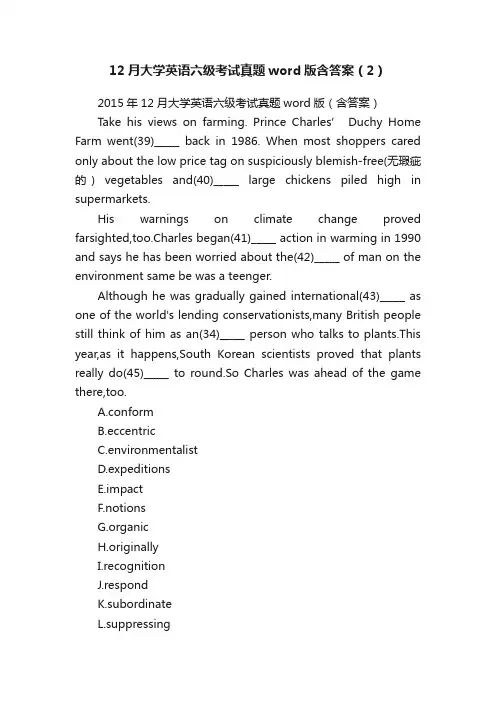
12月大学英语六级考试真题word版含答案(2)2015年12月大学英语六级考试真题word版(含答案)Take his views on farming. Prince Charles’ Duchy Home Farm went(39)_____ back in 1986. When most shoppers cared only about the low price tag on suspiciously blemish-free(无瑕疵的) vegetables and(40)_____ large chickens piled high in supermarkets.His warnings on climate change proved farsighted,too.Charles began(41)_____ action in warming in 1990 and says he has been worried about the(42)_____ of man on the environment same be was a teenger.Although he was gradually gained international(43)_____ as one of the world's lending conservationists,many British people still think of him as an(34)_____ person who talks to plants.This year,as it happens,South Korean scientists proved that plants really do(45)_____ to round.So Charles was ahead of the game there,too.A.conformB.eccentricC.environmentalistD.expeditionsE.impactF.notionsanicH.originallyI.recognitionJ.respondK.subordinateL.suppressingM.throneN.unnaturallyO.urgingSection BDirections: In this section,you are going to read a passage with ten statements attached to it. Each statement contains information given in one of the paragraphs. Identify the paragraph from which the information is derived. You may choose a paragraph more than once. Each paragraph is marked with a letter. Answer the questions by marking the corresponding letter on Answer Sheet 2. High School Sports Aren’t Killing AcademicsA)In this month’s Atlantic cover article, “The Case Against High-School Sports,” Amanda Ripley argues that scho ol-sponsored sports programs should be seriously cut. She writes that, unlike most countries that outperform the United States on international assessments, American schools put too much of an emphasis on athletics, “ Sports are embedded in American school s in a way they are not almost anywhere else,” she writes, “Yet this difference hardly ever comes up in domestic debates about America’s international mediocrity(平庸)in education.”B)American student-athletes reap many benefits from participating in sports, but the costs to the schools could outweigh their benefits, she argues, In particular, Ripley contends that sports crowd out the academic missions of schools: America should learn from South Korea and Finland and every other country at the top level of international test scores, all of whom emphasize athletics far less in school. ”Even in eighth grade, American kids spend more than twice the time Korean kids spend playing sports,” she writes, citing a 2010 study published in theJournal of Advanced Academics.C)It might well be true that sports are far more rooted in American high schools than in other countries. But our reading of international test scores finds no support for the argument against school athletics. Indeed, our own research and that of others lead us to make the opposite case. School-sponsored sports appear to provide benefits that seem to increase, not detract(减少)from, academic success.D)Ripley indulges a popular obsession(痴迷)with international test score comparisons, which show wide and frightening gaps between the United States and other countries. She ignores, however, the fact that states vary at least as much in test scores as do developed countries. A 2011 report from Harvard University shows that Massachusetts produces math scores comparable to South Korea and Finland, while Mississippi scores are closer to Trinidad and T obago. Ripley’s thesis about sports falls apart in light of this fact. Schools in Massachusetts provide sports programs while schools in Finland do not. Schools in Mississippi may love football while in Tobago interscholastic sports are nowhere near as prominent. Sports cannot explain these similarities in performance. They can’t explain international differences either.E)If it is true that sports undermine the academic mission of American schools, we would expect to see a negative relationship between the commitment to athletics and academic achievement. However, the University of Arkansas’s Daniel Bowen and Jay Greene actually find the opposite. They examine this relationship by analyzing schools’ sports winning percentages as well as student-athletic participation rates compared to graduation rates and standardized test score achievement over a five-year periodfor all public high schools in Ohio. Controlling for student poverty levels, demographics(人口统计状况), and district financial resources, both measures of a school’s commitment to athletics are significantly and positively related to lower dropout rates as well as higher test scores.F)On-the-field success and high participation in sports is not random-it requires focus and dedication to athletics. One might think this would lead schools obsessed with winning to deemphasize academics. Bowen and Greene’s results contradict that argument. A likely explanation for this seemingly counterintuitive(与直觉相反的)result is that success in sports programs actually facilitates or reflects greater social capital within a school’s community.G)Ripley cites the writings of renowned sociologist James Coleman, whose research in education was groundbreaking. Coleman in his early work held athletics in contempt, arguing that they crowded out schools’ academic missions. Ripley quotes his 1961 study, The Adolescent Society, where Coleman writes, “Altogether, the trophy(奖品)case would suggest to the innocent visitor that he was entering an athletic club, not an educational institution.”H)However, in later research Coleman would show how the success of schools is highly dependent on what he termed social capital, “the social networks, and the rel ationships between adults and children that are of value for the child’s growing up.”I)According to a 2013 evaluation conducted by the Crime Lab at the University of Chicago, a program called Becoming a Man-Sports Edition creates lasting improvements in t he boys’ study habits and grade point averages. During the first year of the program, students were founds to be less likely to transferschools or be engaged in violent crime. A year after the program, participants were less likely to have had an encounter with the juvenile justice system.J)If school-sponsored sports were completely eliminated tomorrow, many American students would still have opportunities to participate in organized athletics elsewhere, much like they do in countries such as Finland, Germany, and South Korea. The same is not certain when it comes to students from more disadvantaged backgrounds. In an overview of the research on non-school based after-school programs, researchers find that disadvantaged children participate in these programs at significantly lower rates. They find that low-income students have less access due to challenges with regard to transportation, non-nominal fees, and off-campus safety. Therefore, reducing or eliminating these opportunities would most likely deprive disadvantaged students of the benefits from athletic participation, not least of which is the opportunity to interact with positive role models outside of regular school hours.K)Another unfounded criticism that Ripley makes is bringing up the stereotype that athletic XX are typically lousy(蹩脚的)classroom teachers. “American principals, unlike the XX XX of principals around the world, make many hiring decisions with their sports teams in mind, which does not always end well for students,” she writes. Educato rs who seek employment at schools primarily for the purpose of coaching are likely to shirk(推卸)teaching responsibilities, the argument goes. Moreover, even in the cases where the employee is a teacher first and athletic coach second, the additional responsibilities that come with coaching likely comes at the expense of time otherwise spent on planning, grading, and communicating with parents andguardians.L)The data, however, do not seem to confirm this stereotype. In the most rigorous study on the classroom results of high school coaches, the University of Arkansas’s Anna Egalite finds that athletic coaches in Florida mostly tend to perform just as well as their non-coaching counterparts, with respect to raising student test scores. We do not doubt that teachers who also coach face serious tradeoffs that likely come at the expense of time they could dedicate to their academic obligations. However, as with sporting events, athletic coaches gain additional opportunities for communicating and serving as mentors(导师)that potentially help students succeed and make up for the costs of coaching commitments.M)If schools allow student-athletes to regularly miss out on instructional time for the sake of traveling to athletic competitions, that’s bad. However, such iss ues would be better addressed by changing school and state policies with regard to the scheduling of sporting events as opposed to total elimination. If the empirical evidence points to anything, it points towards school sponsored sports providing assets that are well worth the costs.N)Despite negative stereotypes about sports culture and Ripley’s presumption that academics and athletics are at odds with one another, we believe that the greater body of evidence shows that school-sponsored sports programs appear to benefit students. Successes on the playing field can carry over to the classroom and vice versa(反之亦然). More importantly, finding ways to increase school communities’ social capital is imperative to the success of the school as whole, not just the athletes.46.Stunets from low-income families have less access to off-campus sports programs.相关内容参考:1.2.3.4.5.6.7.8.9.10.下载文档。
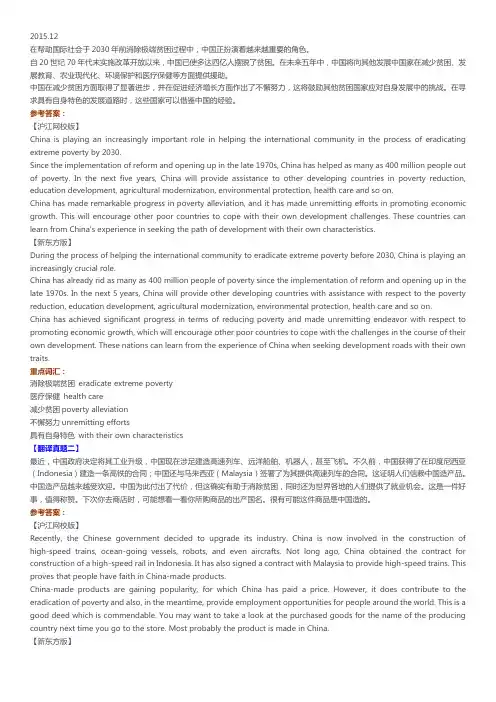
2015.12在帮助国际社会于2030年前消除极端贫困过程中,中国正扮演着越来越重要的角色。
自20世纪70年代末实施改革开放以来,中国已使多达四亿人摆脱了贫困。
在未来五年中,中国将向其他发展中国家在减少贫困、发展教育、农业现代化、环境保护和医疗保健等方面提供援助。
中国在减少贫困方面取得了显著进步,并在促进经济增长方面作出了不懈努力,这将鼓励其他贫困国家应对自身发展中的挑战。
在寻求具有自身特色的发展道路时,这些国家可以借鉴中国的经验。
参考答案:【沪江网校版】China is playing an increasingly important role in helping the international community in the process of eradicating extreme poverty by 2030.Since the implementation of reform and opening up in the late 1970s, China has helped as many as 400 million people out of poverty. In the next five years, China will provide assistance to other developing countries in poverty reduction, education development, agricultural modernization, environmental protection, health care and so on.China has made remarkable progress in poverty alleviation, and it has made unremitting efforts in promoting economic growth. This will encourage other poor countries to cope with their own development challenges. These countries can learn from China's experience in seeking the path of development with their own characteristics.【新东方版】During the process of helping the international community to eradicate extreme poverty before 2030, China is playing an increasingly crucial role.China has already rid as many as 400 million people of poverty since the implementation of reform and opening up in the late 1970s. In the next 5 years, China will provide other developing countries with assistance with respect to the poverty reduction, education development, agricultural modernization, environmental protection, health care and so on.China has achieved significant progress in terms of reducing poverty and made unremitting endeavor with respect to promoting economic growth, which will encourage other poor countries to cope with the challenges in the course of their own development. These nations can learn from the experience of China when seeking development roads with their own traits.重点词汇:消除极端贫困eradicate extreme poverty医疗保健health care减少贫困poverty alleviation不懈努力unremitting efforts具有自身特色with their own characteristics【翻译真题二】最近,中国政府决定将其工业升级,中国现在涉足建造高速列车、远洋船舶、机器人,甚至飞机。
2019年12月大学英语六级考试真题(第3套) Part I Writing (30 minutes) Directions: For this part, you are allowed 30 minutes to write an essay on the importance of having a sense of social responsibility.You shouldwrite at least 150 words but no more than 200 words.Part II Listening Comprehension (30 minutes)特别说明:由于多题多卷,官方第三套真题的听力试题与第二套真题的一致,只是选项顺序不同,因此,本套试卷不再提供听力部分。
Part ⅢReading Comprehension (40 minutes) Section ADirections: In this section, there is a passage with ten blanks. You are required to select one word for each blank from a list of choices given in a word bankfollowing the passage. Read the passage through carefully before makingyour choices. Each choice in the bank is identified by a letter. Please markthe corresponding letter for each item on Answer Sheet 2 with a single linethrough the centre. You may not use any of the words in the bank more thanonce.The persistent haze over many of our cities is a reminder of the polluted air that we breathe. Over 80% of the world’s urban population is breathing air that fails to meet World Health Organisation guidelines, and an estimated 4.5 million people died26 from outdoor air pollution in 2015.Globally, urban populations are expected to double in the next 40 years, and an extra 2 billion people will need new places to live, as well as services and ways to move around their cities. What is more important, the decisions that we make now about the design of our cities will27 the everyday lives and health of the coming generations. So what would a smog-free, or at least low-pollution, city be like?Traffic has become28 with air pollution, and many countries intend to ban the sale of new petrol and diesel cars in the next two decades. But simply29 to electric cars will not mean pollution-free cities. The level of emissions they cause will depend on how the electricity to run them is30 , while brakes, tyres and roads all create tiny airborne31 as they wear out.Across the developed world, car use is in decline as more people move to city centres, while young people especially are32 for other means of travel.Researchers are already asking if motor vehicle use has reached its33 and will decline, but transport planners have yet to catch up with this34 , instead of laying new roads to tackle traffic jams. As users of London’s orbital M25 motorway will know, new roads rapidly fill with more traffic. In the US, studies have shown that doubling the size of a road can35 double the traffic, taking us back to the starting point.A)alternateB)crownC)determineD)generatedE)locatingF)mergedG)miniaturesH)optingI)particlesJ)peakK)prematurelyL)simplyM)switchingN)synonymousO)trendSection BDirections:In this section, you are going to read a passage with ten statements attached to it. Each statement contains information given in one of theparagraphs. Identify the paragraph from which the information is derived.You may choose a paragraph more than once. Each paragraph is markedwith a letter. Answer the questions by marking the corresponding letter onAnswer Sheet 2.How much protein do you really need?[A] The marketing is tempting: Get stronger muscles and healthier bodies with minimal effort by adding protein powder to your morning shake or juice drink. Or grab a protein bar at lunch or for a quick snack. Today, you can find protein supplements everywhere- -online or at the pharmacy, grocery store or health food store. They come in powders, pills and bars. With more than $12 billion in sales this year, the industry is booming and, according to the market research company, Grand View Research, is on tack to sell billions more by 2025. But do we really need all this supplemental protein? It depends. There are pros, cons and some other things to consider.[B] For starters, protein is critical for every cell in our body. It helps build nails, hair, bones and muscles. It can also help you feel fuller longer than eating foods without protein. And, unlike nutrients that are found only in a few foods, protein is present in all foods. “The typical American diet is a lot higher in protein than a lot of us think,” says registered dietitian Angela Pipitone. It’s in foods many of us expect, such as beef, chicken and other types of meat and dairy, But it’s also in foods that may not come immediately to mind like vegetables, fruit, beans and grains.”[C]The U.S. government’s recommended daily allowance (RDA) for the average adultis 50 to 60 grams of protein a day. This may sound like a lot, but Pipitone says: “We get bits of protein here and there and that really adds up throughout the day.” Take, for example, breakfast. If you eat two eggs topped with a little bit of cheese and an orange on the side, you already have 22 grams of protein. Each egg gives you 7 grams, the cheese gives you about 6 grams and the orange -about 2 grams. Add a lunch of chicken, rice and broccoli (西兰花), and you are already over the recommended S0 grams. “You can get enough protein and meet the RDA before you even get to dinner,” says Pipitone.[D] So if it’s so easy to get your protein in food, why add more in the form of powders, snack bars or a boost at your local juice bar? No need to, says Pipitone, because, in fact, most of us already get enough protein in our diet. “Whole foods are always the best option rather than adding supplements,” she says, noting the FDA does not regulate supplements as rigorously as foods or drugs. So there could be less protein, more sugar and some additives you wouldn't expect, such as caffeine (咖啡因).[E] If you are considering a supplement, read the list of ingredients, she says, although this is not always reliable. “I’ve seen very expensive protein supplements that claim to be high quality but they might not really be beneficial for the average healthy adult,”she says. “It could just be a waste of money.”[F] But there are certain situations that do warrant extra protein.“Anytime you’re repairing or building muscle,” Pipitone says, such as if you’re an extreme endurance athlete, training for a marathon, or you’re a body builder. If you’re moderately exercising for 150 minutes a week. as the Centers for Disease Control and Prevention recommends, or less than that, you’re probably not an extreme athlete. Extreme athletes expend lots of energy breaking down and repairing and building muscles. Protein can give them the edge they need to speed that process.[G] Vegans can benefit from protein supplements since they do not eat animal-based protein sources like meat, dairy or eggs. And, for someone always on-the-go who may not have time for a meal, a protein snack bar can be a good option for occasional meal replacement. Also, individuals recovering from surgery or an injury can also benefit from extra protein. So, too, can older people. At around age 60, “muscles really start to break down,” says Kathryn Starr, an aging researcher, “and because of that, the protein needs of an older adult actually increase.”[H] In fact, along with her collage Connie Bales, Starr recently conducted a small study that found that adding extra protein foods to the diet of obese older individuals who were trying to lose weight strengthened their muscles. Participants in the study were separated into two groups -one group was asked to cat 30 grams of protein per meal in the form of whole foods. That meant they were eating 90 grams of protein a day. The other group-the control group-was put on a typical low-calorie diet with about 50 to 60 grams of protein a day. After six months, researchers found the high protein group had significantly improved their muscle function-almost twice as much as the control group.“They were able to walk faster, had improved balance, and were also able to get up out of a chair faster than the control group,” Starr says. All 67 participants were over 60 years of age, and both groups lost about the same amount of weight.[I] Starr is now looking into whether high-protein diets also improve the quality of the muscle itself in seniors. She’s using CT scans to measure muscle size and fat, and comparing seniors on a high-protein diet with those on regular diets. She says her findings should be available in a couple of months.[J] In the meantime, 70-year-old Corliss Keith, who was in the high protein group in Starr’ latest study, says she feels a big difference. “I feel excellent,” she says. “I feel like I have a different body, I have more energy, I’m stronger.” She says she is able to take Zumba exercise classes three times a week, work out on the treadmill (跑步机), and take long, brisk walks. Keith also lost more than 15 pounds. “I’m a fashionable person, so now I’m back in my 3-inch heels,” she says.[K] As people age, Starr says muscle strength is key to helping them stay strong and continue living on their own in their own home. “I feel very much alive now,” says Keith. I feel like I could stay by myself until I’m 100.”[L] But can people overdo protein? Pipitone says you do have to be careful. Other researchers say too much protein can cause cramps (痉挛), headaches, and fatigue. Dehydration (脱水) is also a risk when you eat too much protein. Pipitone says if you increase protein, you also have to increase your fluid intake. “I always tell people to make sure they’re drinking enough fluids,” which for the average person is 60 to 70 ounces a day, which translates into eight 8-ounce glasses of water or liquid per day.[M] There have been some indications that extra protein makes the kidneys work harder, which could be problematic for individuals with a history of kidney disease and for them, the supplements may increase the risk of kidney stones, she says.[N] Bottom line, if you think you need more protein in your diet, consider these questions: Are you an extreme athlete; are you recovering from injury or surgery; or are you 60 years or older? If so, adding high protein foods like eggs and meat products to your diet can be beneficial. And, if you’re not sure, it is always a good idea to check with your primary care provider.36.It is quite easy for one t take in the recommended amount of protein.37.Pipitone claims that healthy adults need to spend money on protein supplements.38.The protein supplement business is found to be thriving.39.Protein can spend the requiring of damaged muscles.40.Protein supplements may overburden some internal organ, thus leading to its malfunctioning.41.Older adults need to take in more protein to keep their muscles strong.42.Protein is found in more foods than people might realize.43.Additional protein was found to help strengthen the muscles of overweight seniors seeking weight loss.44.Pipitone believes that whole foods provide the best source of protein.45.People are advised to drink more liquid when they take in more protein.Section CDirections:There are 2 passages in this section. Each passage is followed by some questions or unfinished statements. For each of them there are four choices marked A),B),C)and D).You should decide on the best choice and mark the corresponding letter on Answer Sheet 2 with a single line through the centre.Passage OneQuestions 46 to 50 are based on the following passage.Last year, a child was born at a hospital in the UK with her heart outside her body. Few babies survive this rare condition, and those who do must endure numerous operations and are likely to have complex needs. When her mother was interviewed, three weeks after her daughter’s birth, she was asked if she was prepared for what might be a daunting(令人生畏的) task caring for her. She answered without hesitation that, as far as she was concerned, this would be a “privilege”.Rarely has there been a better example of the power of attitude, one of our most powerful psychological tools. Our attitudes allow us to turn mistakes into opportunities, and loss into the chance for new beginnings. An attitude is a settled way of thinking, feeling and/or behaving towards particular objects, people, events or ideologies. We use our attitudes to filter, interpret and react to the world around us. You weren’t born with attitudes; rather they are all learned, and this happens in a number of ways.The most powerful influences occur during early childhood and include both what happened to you directly, and what those around you did and said in our presence. As you acquire a distinctive identity, your attitudes are further refined by the behavior of those with whom you identify-your family, those of your gender and culture, and the people you admire, even though you may not know them personally. Friendships and other important relationships become increasingly important, particularly during adolescence. About that same time and throughout adulthood, the information you receive, especially when ideas are repeated in association with goals and achievements you find attractive, also refines your attitudes.Many people assume that our attitudes are internally consistent, that is, the way you think and feel about someone or something predicts your behavior towards them. However, many studies have found that feelings and thoughts don’t necessarily predict behavior. In general, your attitudes will be internally consistent only when the behavior is easy, and when those around you hold similar beliefs. That’s why, for example, many say they believe in the benefits of recycling or exercise, but don’t behave in line with their views, because it takes awareness, effort and courage to go beyond merely stating that you believe something is a good idea.One of the most effective ways to change an attitude is to start behaving as if you already feel and think the way you’d prefer to. Take some time to reflect on yourattitudes, to think about what you believe and why. Is there anything you consider a burden rather than a privilege? If so, start behaving-right now-as if the latter is the case.46. What do we learn from the passage about attitude?A) It shapes our beliefs and ideologies.B) It improves our psychological wellbeing.C) It determines how we respond to our immediate environment.D) It changes the way we think, feel and interact with one another.47. What can contribute to the refinement of one’s attitude, according to the passage?A) Their idol’s behaviors.B) Their educational level.C) Their contact with the opposite gender.D) Their interaction with different cultures.48. What do many studies find about people’s feelings and thoughts?A) They may not suggest how a person is going to behave.B) They are in a way consistent with a person’s mentality.C) They may not find expression in interpersonal relations.D) They are in line with a person’s behavior no matter what.49. How come many people don’t do what they believe is good?A) They can’t afford the time.B) They have no idea how to.C)They are hypocritical.D) They lack willpower.50. What is proposed as a strategy to change attitude?A) Changing things that require one’s immediate attention.B) Starting to act in a way that embodies one’s aspirations.C)Adjusting one’s behavior gradually over a period of time.D) Considering ways of reducing one’s psychological burdens.Passage TwoQuestion 51 to 55 are based on the following passage.Industrial fishing for krill(磷虾) in the unspoilt waters around Antarctica is threatening the future of one of the world’s last great widernesses, according to a new report.The study by Greenpeace analysed the movements of krill fishing vessels in the region and found they were increasingly operating “in the immediate vicinity of penguin colonies and whale-feeding grounds”. It also highlights incidents of fishing boats being involved in groundings, oil spills and accidents, which posed a serious threat to the Antarctic ecosystem.The report, published on Tuesday, comes amid growing concern about the impactof fishing and climate change on the Antarctic. A global campaign has been launched to create a network of ocean sanctuaries to protect the seas in the region and Greenpeace is calling for an immediate halt to fishing in areas being considered for sanctuary status.Frida Bengtsson from Greenpeace’s Protect the Antarctic campaign said: If the krill industry wants to show it’s a responsible player, then it should be voluntarily getting out of any area which is being proposed as an ocean sanctuary, and should instead be backing the protection of these huge tracts of the Antarctic.”A global campaign has been launched to turn a huge tract of Antarctic seas into ocean sanctuaries, protecting wildlife and banning not just krill fishing, but all fishing. One was created in the Ross Sea in 2016, another reserve is being proposed in a vast area of the Weddell Sea, and a third sanctuary is under consideration in the area west of the Antarctic Peninsula -a key krill fishing area.The Commission for the Conservation of Antarctic Marine Living Resources (CCAMLR) manages the seas around Antarctica. It will decide on the Weddell Sea sanctuary proposal at a conference in Australia in October, although a decision on the peninsula sanctuary is not expected until later.Keith Reid, a science manager at CCAMLR, said that the organisation sought “a balance between protection conservation and sustainable fishing in the Southern Ocean.” He said although more fishing was taking place nearer penguin colonies it was often happening later in the season when these colonies were empty.“The creation of a system of marine protected areas is a key part of ongoing scientific and policy discussions in CCAMLR,” he added. “Our long- term operation in the region depends on a healthy and thriving Antarctic marine ecosystem, which is why we have always had an open dialogue with the environmental non-governmental organisations. We strongly intend to continue this dialogue, including talks with Greenpeace, to discuss improvements based on the latest scientific data. We are not the ones to decide on the establishment of marine protected areas, but we hope to contribute positively with our knowledge and experience.”51. What does Greenpeace’s study find about krill fishing?A) It caused a great many penguins and whales to migrate.B) It was depriving penguins and whales of their habitats.C)It was carried out too close to the habitats of penguins and whales.D)It posed an unprecedented threat to the wildlife around Antarctica.52. For what purpose has a global campaign been launched?A) To reduce the impact of climate change on Antarctica.B) To establish conservation areas in the Antarctic region.C) To regulate krill fishing operations in the Antarctic seas.D) To publicise the concern about the impact of krill fishing.53. What is Greenpeace’s recommendation to the krill industry?A) Opting to operate away from the suggested conservation areas.B) V olunteering to protect the endangered species in the Antarctic.C) Refraining from krill fishing throughout the breeding season.D) Showing its sense of responsibility by leading the global campaign.54. What did CCAMLR aim to do according to its science manager?A) Raise public awareness of the vulnerability of Antarctic species.B) Ban all commercial fishing operations in the Southern Ocean.C) Keep the penguin colonies from all fishing interference.D) Sustain fishing without damaging the Antarctic ecosystem.55. How does CCAMLR define its role in the conservation of the Antarctic environment?A) A coordinator in policy discussions.B) An authority on big data analysis.C) A provider of the needed expertise.D) An initiator of marine sanctuaries.Part IV Translation (30 minutes) Directions: For this part, you are allowed 30 minutes to translate a passage from Chinese into English. You should write your answer on Answer Sheet 2.牡丹( peony)花色艳丽,形象高雅,象征着和平与繁荣,因而在中国被称为“花中之王”。
Directions:For this part, you are allowed 30 minutesto write a short essay based on thepicture below. You should focuson theimpact of social networking websites onreading.“I love reading. I read about 3 hoursaday.My favorite book is Facebook.”*Facebookis the name of a social networkingwebsite.此文预计会引发巨大争议,有人会认为FB和朋友圈这类东西完全不是正真意义的“阅读”,但是也有认为,这才是当今时代有特色的阅读,其实,能说明白就好,观点没有正误。
Impact的含义:影响。
第一段: 描述漫画内容.强调网络阅读的趋势和现象第二段: 分析网络读书的原因. ( 或阐述不同的人的不同观点)在这一段,既可以把网络阅读的影响力归结为利大于弊,也可以归结为弊大于利,自圆其说即可。
第三段:双面总结,得出结论.Thepi cture describes a conversation between two people,one of them said: “I readabout 3 hours a day. My favorite book isFacebook.” The picture intends toinform us that the Internet hasexerted an important influence on reading forthe moderncitizens.The phenomenon involves many factors,which canbe listed as the follows. To begin with, with the rapiddevelopment ofscientific technology, The Internet has becomeindispensable in our daily life.Undoubtedly, it provides peoplewith many advantages and makes our life morecomfortable andefficient, including the way ofreading. What’smore, it is a moreadvanced way toget information needed by people, and an efficient way to searchformaterials. “I have hardly ever bought any books since 2003. I havebeenreading online in recent years.” said professor Wang fromPeking University.“With the click of the mouse, any stories orinformation that I want at anygiven time or place, is there.” shesaid. This may well explain why so manypeople now prefer to embracethe wonders of the Internet than read print copiesof book or anyother reading material.Every coin hastwo sides, reading in social networkingwebsites is no exception. Admittedly,there is false and uselessinformation on the social networking websites, it isadvisable thatwe read more critically and carefully.六级作文信息技术版参考范文有道考神版本答案,转载请注明出处考神团队:@老师王菲@建昆老师For this part,you are allowed 30 minutes to write a short essay based on the picture belo w. You should focus on the difficulty in acquiring useful information in spite of adv anced information technology. You are required to write at least 150 words but no mor e than 200 words.第一段: 描述漫画内容.强调网络信息对我们生活的影响.第二段: 阐述网络信息技术找寻信息的弊端.第三段: 得出结论.The picture describes a conversation among several people,one of them complains: “we havelots of inform ation technology; wejust don’t have much useful information.” Itis safe to figure outthat our lives are full of information technology, but wearesupposed to have the ability to distinguish the useful ones fromtheuseless ones.The human beings are stepping intotheinformation society. The information industry develops veryrapidly, so does theinformationtechnology. Informationtechnology brought us many benefits, as well as theunexpected sideeffects. First, when we search for information on the Internet,itcomes out that the useful information and useless ones appeartogether. Italways takes us long time to separate them. What makesthings worse is thatsome information on the Internet even misleadsthe people who cherish the hopeof acquiring the useful knowledgefrom the Internet. Thus,information technology becomes an impending importantissue.Through the above analysis on information technology,Ibelieve that the positive aspects far outweigh its negative onesthough thetechnology does bring us some unwantedinformation. Ascollege students, weshould enhance the awareness of recognizing theuseful information when we are surfingthe net.第三版第一段: 描述漫画内容.强调误导信息的存在对我们的影响.第二段: 误导性信息对我们的影响的阐述. (可以结合具体的例子.)第三段: 提出方法解决这一问题It can be clearly seen that the coupleare discussing theinformation on the Internet, one of them said: “I justfeelunfortunate to live in a world with so much misleadinginformation.” Theconversation of the cartoon picture conveys themessage that people attained informationfrom the Internet, some ofwhich might be misleading.Along with the development of societyand technology, anincreasing number of problems are brought to our attention,one ofwhich is that misleading information exists on the Internet.Here is an exampleI got from my friend, which works well in thecase. She expected to discover acure from the Internet when hermother got a certain disease. Unfortunately,that so called “cure”from the Wechat moments did not work at all and hermother’s healthycondition got worse. Such misleading information oftenwastepeople’s time and may result in even severeconsequences.In view of the problem, effectivemeasures should be taken.For one thing, it is high time that we realized theimportance ofability to separate the useful information from the misleadingones.Thus, critical thinking is of great importance. For another,thegovernment should issue strict laws and regulations to put thesituation undercontrol.六级翻译(贫困版)有道考神版本答案,转载请注明出处,时间仓促,译文仅供参考,欢迎讨论。
2015年12月六级考试真题(第三套) Part I Writing (30 minutes) Directions: For this part, you are allowed 30 minutes to write a short essay based on the picture below.You should focus on the harm caused by misleading information online.You are required to write at least 150 words but no more than 200 words.
Part II Listening Comprehension (30 minutes) 说明:2015年12月六级真题全国共考了两套听力。本套(即第三套)的听力内容与第二套的完全一样,只是选项的顺序不一样而已,故在本套中不再重复给出。
Part III Reading Comprehension (40 minutes) Section A Directions: In this section, there is a passage with ten blanks. You are required to select one word for each blank from a list of choices given in a word bank following the passage. Read the passage through carefully before making your choices. Each choice in the bank is identified by a letter. Please mark the corresponding letter for each item on Answer Sheet 2 with a single line through the centre. You may not use any of the words in the bank more than once. Questions 36 to 45 are based on the following passage. As it is, sleep is so undervalued that getting by on fewer hours has become a badge of honor. Plus, we live in a culture that 36 to the late-nighter, from 24-hour grocery stores to online shopping sites that never close. It’s no surprise, then, that more than half of American adults don’t get the 7 to 9 hours of shut-eye every night as 37 by sleep experts. Whether or not we can catch up on sleep—on the weekend, say—is a hotly 38 topic among sleep researchers. The latest evidence suggests that while it isn’t 39 , it might help. When Liu, the UCLA sleep researcher and professor of medicine, brought 40 sleep-restricted people into the lab for a weekend of sleep during which they logged about 10 hours per night, they showed 41 in the ability of insulin (胰岛素) to process blood sugar. That suggests that catch-up sleep may undo some but not all of the damage that sleep 42 causes, which is encouraging, given how many adults don’t get the hours they need each night. Still, Liu isn’t 43 to endorse the habit of sleeping less and making up for it later. Sleeping pills, while helpful for some, are not 44 an effective remedy either. “A sleeping pill will 45 one area of the brain, but there’s never going to be a perfect sleeping pill, because you couldn’t really replicate (复制) the different chemicals moving in and out of different parts of the brain to go through the different stages of sleep,” says Dr. Nancy Collop, director of the Emory University Sleep Center.
A) alternatively I) negotiated B) caters J) pierce C) chronically K) presumption D) debated L) ready E) deprivation M) recommended F) ideal N) surpasses G) improvements O) target H) necessarily
Section B Directions: In this section, you are going to read a passage with ten statements attached to it. Each statement contains information given in one of the paragraphs. Identify the paragraph from which the information is derived. You may choose a paragraph more than once. Each paragraph is marked with a letter. Answer the questions by marking the corresponding letter on Answer Sheet 2.
Climate Change May Be Real, But It’s Still Not Easy Being Green How do we convince our inner caveman to be greener? We ask some outstanding social scientists. [A] The road to climate hell is paved with our good intentions. Politicians may tackle polluters while scientists do battle with carbon emissions. But the most pervasive problem is less obvious: our own behaviour. We get distracted before we can turn down the heating. We break our promise not to fly after hearing about a neighbour’s trip to India. Ultimately, we can’t be bothered to change our attitude. Fortunately for the planet, social science and behavioural economics may be able to do that for us.
[B] Despite mournful polar beats and charts showing carbon emissions soaring, most people find it hard to believe that global warming will affect them personally. Recent polls by the Pew Research Centre in Washington, DC, found that 75-80 per cent of participants regarded climate change as an important issue. But respondents ranked it last on a list of priorities.
[C] This inconsistency largely stems from a feeling of powerlessness. “When we can’t actually remove the source of our fear, we tend to adapt psychologically by adopting a range of defence mechanisms,” says Tom Crompton, change strategist for the environmental organisation World Wide Fund for Nature.
[D] Part of the fault lies with our inner caveman. Evolution has programmed humans to pay most attention to issues that will have an immediate impact. “We worry most about now because if we don’t survive for the next minute, we’re not going to be around in ten years’ time,” says Professor Elke Weber of the Centre for Research on Environmental Decisions at Columbia University in New York. If the Thames were lapping around Big Ben, Londoners would face up to the problem